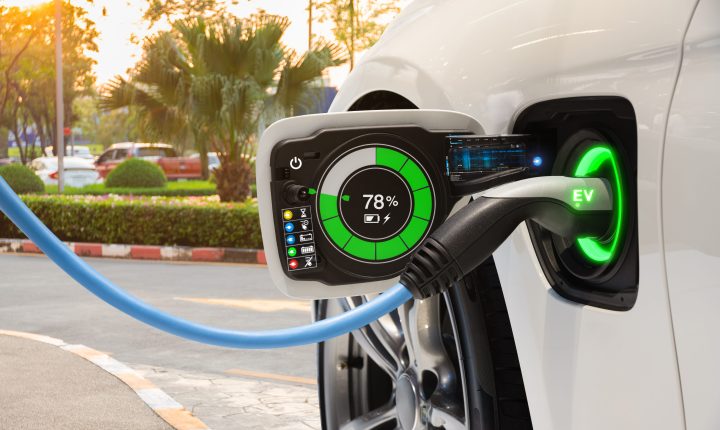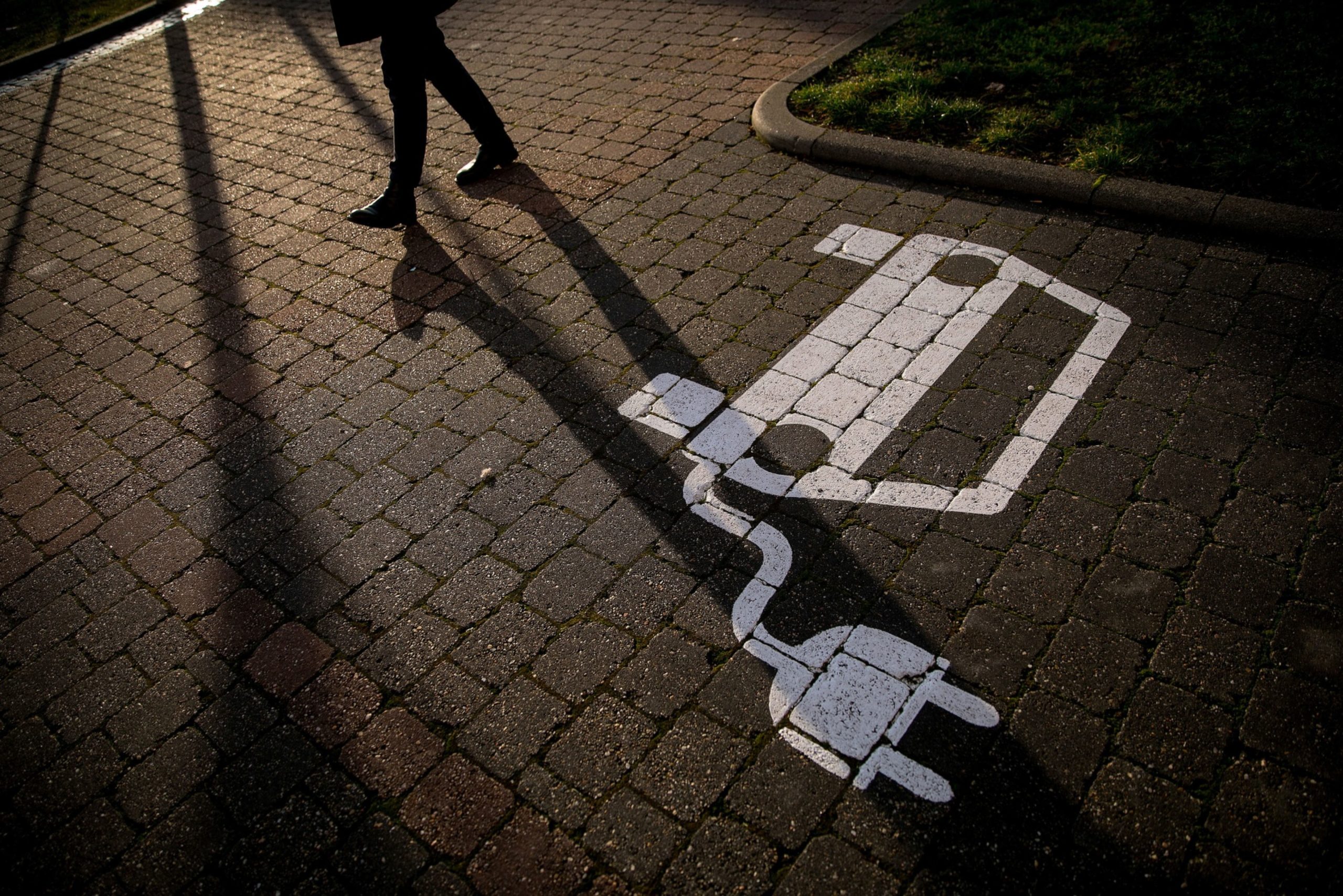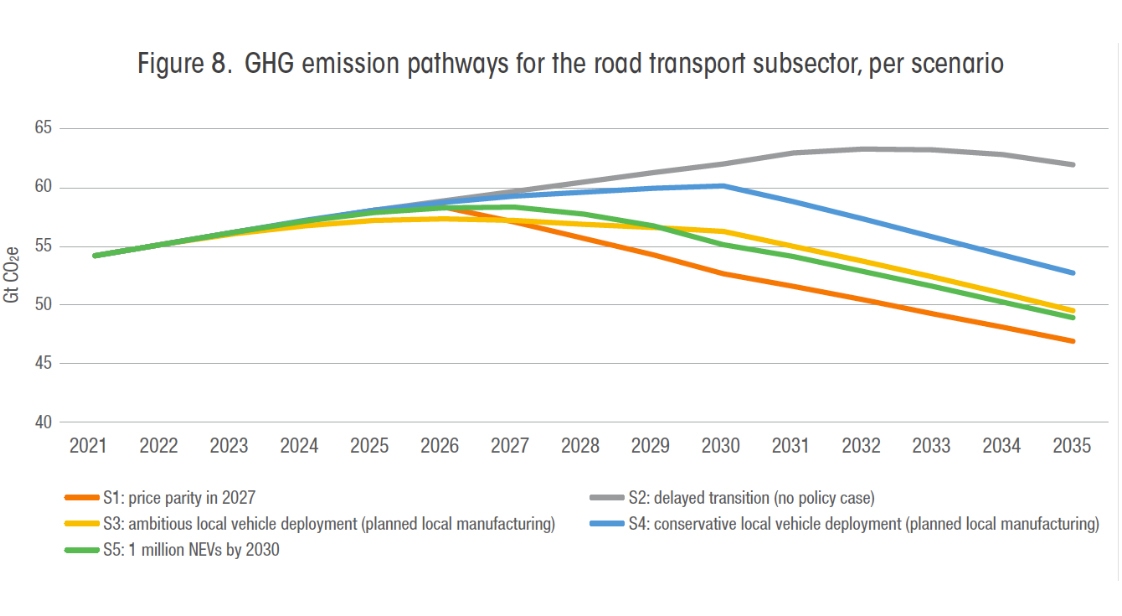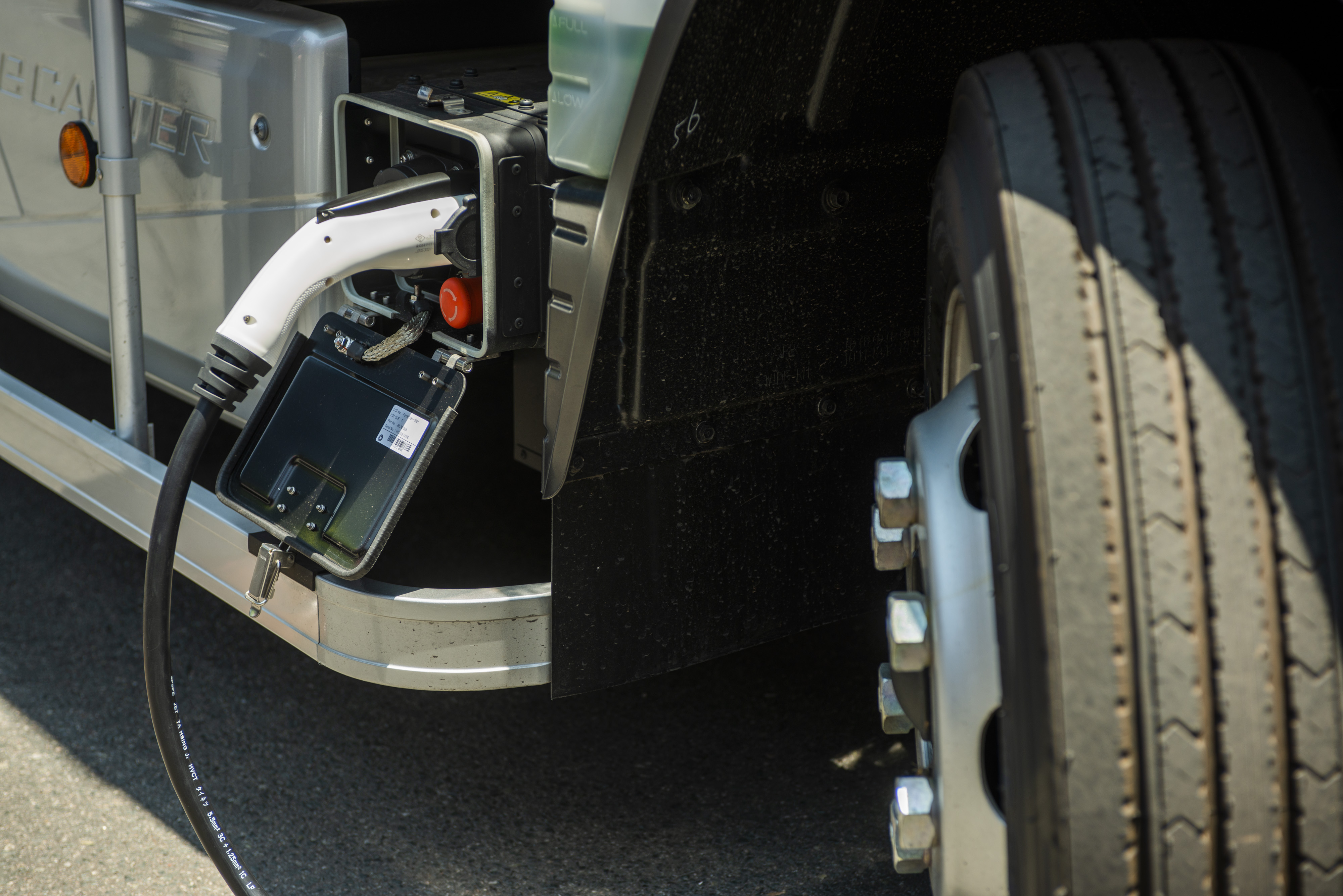ANALYSIS
Unplugged: Why is South Africa so far behind on the race to electrify vehicles?

In the midst of what seems like a never-ending energy crisis, it seems absurd to consider electrifying our transport. But the global race to electrify vehicles is picking up — EVs are integral to meeting our emission targets, and with three of every four vehicles manufactured in SA destined for the EU and UK — who have announced a ban on the sale of new ICE vehicles from 2030 and 2035 respectfully — SA is about to be left in the dust.
The International Energy Agency (IEA) reported in their annual Global EV Outlook for 2023 that 14% of all cars sold worldwide in 2022 (amounting to 10 million) were electric.
This is hard to imagine in South Africa, which has about 2,300 electric vehicles driving among our 12 million total vehicles on the road.
With SA’s transport sector being the second biggest polluter after the power industry — accounting for 13% of CO2 emissions, with road transport accounting for 91.2% of these transport emissions (diesel and motor gasoline are the main contributing fuels), and over two-thirds of our cars manufactured here exported overseas, our non-existent EV industry is baffling at best, and concerning to sustainable and automotive industry experts.
Are electric vehicles really better for the environment?
The short answer is, yes. But as this is a controversial and heated debate — here’s a breakdown.
A common criticism of battery-electric vehicles (or EVs) is that their overall life cycle (which includes mining for raw materials, manufacturing, fuel cycle, use and end-of-life recycling) has higher environmental impacts than internal combustion engine vehicles (ICEVs).
Another critique which is valid to consider in an economy that is as coal-reliant as South Africas is that if you charge your EV on a grid that is heavily reliant on fossil fuels (in SA coal currently provides 88% of the country’s energy supply), you would actually cause more emissions than if you drove an ICEV.
Harro von Blottnitz, Professor of engineering and sustainable development and director of the Energy Systems Research Group at the University of Cape Town explained to Daily Maverick that a common misunderstanding with life cycle assessments arises from the attributional nature of most of them: “they assume that the electric vehicle will be charged with the same electricity that we currently have, which is fundamentally wrong because as we have more and more EVs come onto the grid, we will need new sources of electricity, and all the new build will be renewable energy.”
Additionally, von Blottnitz argues that a reason EVs are the greener option than ICEVs in SA — even with our coal-heavy energy sector — is that some of the liquid fuels in SA are made from coal, which doubles the per km emissions for cars running on such.
Von Blotnitz explained you are using a liquid fuel (diesel or petrol) made by Sasol’s Secunda synthetic fuel plant to power your ICEV, it will have 30-40% higher carbon emissions than driving with an EV (even one charged on our coal heavy national grid).
“We often underplay how EVs are zero-emission vehicles at the tailpipe,” said von Blottnitz, speaking to the health considerations of EVs. “And one of the main reasons that they’ve been so successful and supported in China and in Europe is clean air in the cities,” adding that SA does have sizable urban air pollution issues and many of our cities related to tailpipe emissions.
Anthony Dane, decarbonisation specialist and director of Change Pathways acknowledged that, objectively, the greenhouse gas benefits you’d get from using an EV that you have to charge on a coal-intensive grid are marginal at best, and could be negative.
However, Dane agreed with von Blottnitz that if the grid were to decarbonise massively, the benefits of EVs would be significant.

A pedestrian passes an empty electric vehicle charge point space in a parking lot in the market square in Gruenheide, Germany, 13 January 2020. (Photo: Krisztian Bocsi / Bloomberg)
Dane said that his subjective perspective of life cycle assessments (LCAs) however, is that they can be somewhat of a red herring, or more detrimental than positive because they can be used to confuse you and we get lost in the technicalities and apples and oranges debates and lose sight of our main objective.
As Tobias Bischof-Niemz, who established and led the Energy Centre at the South African Council for Scientific and Industrial Research (CSIR) and served on the inaugural South African Ministerial Advisory Council on Energy (Mace) told Daily Maverick, “the simple answer is — yes. South Africa should introduce battery electric vehicles, big time.”
Bischof-Niemz, who is now the CEO of German renewable energy company Enertrag South Africa, explained that along with the reduced emissions, in a country like SA, EVs reduce the reliance on imported oil fuels which are dollarised and which is a huge burden on trade balance for SA.
Additionally, LCAs apply different value judgements to different aspects — “someone may or may not put a particular value on greenhouse gases, but then what about air quality? What about water?” asked Dane.
“Those are just environmental — what about human rights? How do we compare the negative human rights impacts associated with cobalt mining, to reduction in greenhouse gases?”
Bischof-Niemz added that, “because battery electric vehicles are so efficient, that even if you charge in the beginning with coal-based power, you’re still not worse from a C02 perspective compared to a diesel car.”
Electric vehicles are twice as efficient as ICEVs — we need half the amount of energy to do the same travelling.
So why don’t we have EVs on the road?
South Africa doesn’t manufacture EVs locally — only some hybrids from Toyota and Mercedes Benz — so if you want to buy one, it would be an EV imported from overseas, which is expensive.
Dr Norman Lamprecht, the executive manager of Trade, Research and Exports for the National Association of Automobile Manufacturers of South Africa (Naamsa) told Daily Maverick that one of the inhibitors is that the price differential between a BEV and an ICEV is around 52% with no demand side support in place to address this.
“In many other countries in the world the governments provide an incentive such as cash grants or tax benefits to reduce the price gap in order to stimulate sales of EVs,” said Lambrecht.
And this is the biggest reason for SA losing the EV race – lack of policy incentives from government.
What we do have is the Green Transport Strategy for South Africa: (2018-2050) from the Department of Transport which has a short-term strategy of converting 5% of the public and national fleet to cleaner alternative fuel and efficient technology vehicles by 2025, with an annual increase of 2% thereafter.
While Dane says the green policy strategy is still relevant, the bigger policy driver is coming from the Department of Trade, Industry and Competition (DTIC) who published the Green Paper on Advancement of New Energy Vehicles in May 2021.
However, Daily Maverick previously reported that the DTIC undertook to issue a White Paper by the end of 2021 — but we’re still waiting.
Lambrecht said that the White Paper would provide the long-term strategy for the country to transition to NEVs, “but it should be informed by how to get there such as the support to stimulate sales and manufacture the vehicles and components in the country,” adding that, “the industry is still awaiting clarity on the support measures.”
The world is shifting — and if we don’t shift with it, our economy will lose out
SA’s automotive manufacturing industry exports over 66% of its light vehicle production overseas — in 2022 alone, 350,000 left-and right-hand drive vehicles were exported to 110 countries around the world.
The automotive industry contributed 4.9% to the country’s GDP (2.9% manufacturing and 2% retail) and comprising of 16.5% of South Africa’s total trade GDP.
The European Union (EU) and the UK, as a bloc, remained South Africa’s largest export region in 2022, accounting for R133.2-billion, or 58.6%, of total automotive exports of R227.3 billion in 2022, according to Naamsa.
With three out of every four vehicles exported destined for the EU and the UK in 2022, the SA manufacturing industry faces a huge risk by not producing EVs, and both the UK and the EU have announced a ban on the sale of new ICE vehicles from 2030 and 2035, respectively.
“I think these bans, particularly the UK, were a really big wake-up call for South Africa, particularly the DTIC, to say, what are we doing?” reflected Dane.
“There are signs that the world is shifting to electric, and we’re still very much structured around producing related value chain components.”
Dane said the most momentum seems to be coming from an environmental perspective with the President’s Just Energy Transition Investment Plan (JET-IP) — which was designed to accelerate the move away from coal in a way that protects vulnerable workers and communities, and develop new economic opportunities — as new energy vehicles would help us meet our emission reduction targets (our Nationally Determined Contributions to the Paris Agreement).

The JET-IP acknowledges that the rollout of NEVs will require government support, stating, “the current policy tools may be augmented, subject to budgetary constraints and additional proposed tax incentives. To accelerate this plan, and fast track deployment of locally produced NEVs in the South African market, the country needs additional support.”
The JET-IP highlights that the country’s social and environmental ambitions and the problems the transport sector faces, “unequal and inefficient public transport sector; low use of rail for the transport of freight; and ageing infrastructure with a high maintenance backlog” can be addressed by the transport transition.
Why would we aim to electrify our transport in an energy crisis?
Dane acknowledged that it would be irresponsible for us to ramp up our EV development amid an energy crisis.
“But that’s a short-term reality — we have to recognise the energy crisis, but we also must take steps to make a more conducive environment,” said Dane, and you only have to look at how the global EV market has continued to grow — from 5% of all new cars sold in 2020 being electric, to 9% in 2021 and 14% in 2022, according to the IEA.
“The economics are shifting, and we are going to be on the losing end of it,” said Dane, explaining that the levelised cost of transport and the total cost of ownership will shift, and we will end up paying more for ICEVs.
A model created by UCT’s Energy Systems Research Group found that it’s likely SA’s transport was to be fully electrified by 2040, and that electric vehicles will draw 20% of all the electricity that we will need to produce in that year.

A charging plug sits inserted into an electric Mitsubishi Fuso Truck & Bus Corp truck during the launch of AB InBev Africa’s renewable energy programme at the SABMiller plc Chamdor brewery, a unit of Anheuser-Busch InBev, in Johannesburg, South Africa, on 16 January 2019. (Photo: Waldo Swiegers / Bloomberg via Getty Images)
Von Blottnitz, the director ESRG, explained that their models don’t predict the future, “but we ask ‘what if’ questions and produce rich analysis to say what a rational decision-maker would do.”
Using international data and their own intelligence of how electricity prices will evolve in South Africa, the model projects that the cost parity will be reached by a certain year and then things will just happen by themselves.
“[The transition to EVs] anywhere between three years from now and 2030, roughly, and then it will happen very quickly,” said von Blottnitz. “Our government’s policy can slow that down a little bit, or speed it up a little bit.”
Von Blottnitz acknowledged that while we will need to add more capacity to the grid for the electric vehicles to meet that demand, “it’s a number that we can plan to and work with”.
When asked how we can afford to have charging infrastructure in an energy crisis, director of Energy and E-Mobility at renewable energy company Rubicon (which also has EV charging infrastructure) Greg Blandford said, “The first priority when installing chargers is to find sites which have renewable energy systems installed.
“It is very likely that South Africa will see larger capacity chargers coupled with solar and battery energy storage systems which would have very little impact on the grid.”
Blandford added that even if a charger only uses grid power, the net effect of that power supplied to the EV vs the fossil fuel emissions if it were an ICE vehicle, is still half — it’s not ideal but as mentioned we are transitioning to a new form of fuel, and it will not always be perfect during this transition.”
Blandford explained to Daily Maverick that currently the electric vehicle charging network consists of three segments:
- Public charging (Intercity) along national travel routes between cities — this is typically larger type DC chargers up to 200kW or higher.
- Public charging and semipublic charging — this is typically a mix of lower capacity DC and AC charging found at shopping malls, business parks, hotels, golf courses and B&Bs.
- Private — typically home chargers and private businesses.
Rubicon already provides public charging stations and has plans to roll out additional stations to get to a total of 219 across the country by the end of the year.
Blandford explained that many EV owners charge privately — with 80% of EV owners charging at home globally — and when EVs were introduced to SA, Eskom welcomed it as owners would charge at home during off-peak periods, typically between 10pm and 4am.
“Globally we are transitioning to greener technologies and along the way we will make some mistakes, but we are at a point where electric vehicles will dominate mobility, whether it be two wheels or four wheels,” said Blandford. “We need to adapt rapidly in South Africa as our vehicle manufacturing sector is at risk.”
On the road
And charging with the semi-public sector has already kicked off — with Zimi Charge, a Cape Town-based company that provides charging solutions for electric fleets for business-to-business companies (logistics, delivery, technical services).
Michael Maas, CEO and founder of Zimi told Daily Maverick that there’s about a 50/50 split between clients who use the national grid and clients who have their own off-grid solar installation for the charging station — and those on the grid are looking to move to solar.
Many of their clients’ locations have big parking lots next to warehouses and the “solar itself will be installed either on the roof of the warehouse or as on the parking lot, almost like the shading”.
“I think, as a nation that’s very susceptible to climate change, we definitely have to take on this challenge,” added Maas.
“We can’t shy away from it — even though it’s complex, and we’re struggling to just have power available, we have to be responsible for the environment. And you have to start looking at this quite seriously.”
Not losing sight of the main objective
Dane said that what we need to be wary of during these debates around renewables and electrifying our transport is the risk that we get blinkered quoting, as described by environmental writer George Monbiot:
“We are too focused on the ‘micro-consumerist bollocks: tiny issues such as plastic straws and coffee cups, rather than the huge structural forces driving us towards catastrophe.’”
“We mustn’t lose sight of what we’re trying to do here,” said Dane.
“If we’re trying to reduce emissions, if we’re trying to improve access and reduce the cost of transport, particularly for those who need it most, let’s think about that. If we’re trying to support the automotive industry, let’s think about that.
“Let’s get clear on what these are on their own and then think about how they interrelate — because they do.” DM/OBP



















 Become an Insider
Become an Insider
Off-grid charging infrastructure is definitely part of the solution. Local company Zero Carbon Charge is rolling out a national network of off-grid charging stations. All these ultra-fast chargers will be powered by 100% renewable energy.
Phase 1 will include 120 charging stations next to national roads and some busy routes.
You will be able to charge your EV in about 20 minutes when traveling in SA.
The first charging station will be constructed end of 2023 at Dassiesfontein farm stall.
It is high time South Africans become less dependent on what others are doing for us and more willing to start providing for ourselves. For instance, look at our whole attitude regarding energy & electricity – we don’t want to progress because we want to wait until Eskom has sorted their problems, instead of starting to generate our own electricity. On the long run it is going to be cheaper, and electric vehicles are going to be far cheaper to run also, because an electric motor is far more efficient than an internal combustion engine – in fact twice as efficient. All we have to do is start to do things for ourselves again, as we did 50 years ago, when I was still a child.